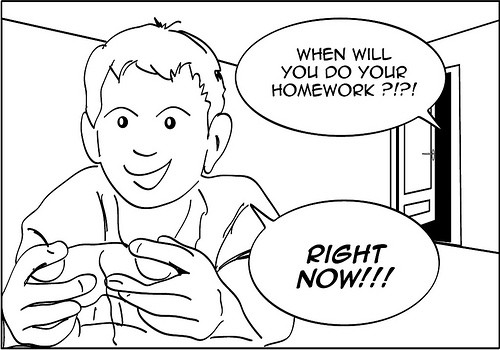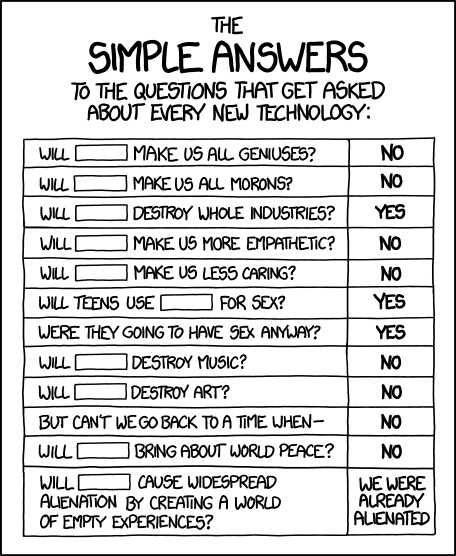Tech Be Nimble
|
"There's nothing transformative about every kid having an iPad unless you're able to reach higher-order teaching and learning...If schools take all this technology, and use it like a textbook, or just have teachers show PowerPoint [presentations] or use drill-and-kill software, they might as well not even have it."
Agreed. You can find the full article here, but the short version is this: until we fundamentally change the way we teach, throwing money into ed. tech. will do nothing to improve student achievement. If you're even loosely connected to an institution of public education, you've probably heard two types of stories: 1) one or two spectacular examples of teachers going above and beyond to integrate rich and robust uses of technology into student-centered classrooms with learning (!) and collaboration (!), and 2) all the rest of the stories. When teachers use technology to replace an existing practice, rather than to transform the way they teach, nothing really changes. There's nothing revolutionary about reading a book on a screen instead of paper (with the exception of those readers who benefit from being able to customize text size and contrast). Instead, we need to focus on ways to shift from content-deliverers to creation-facilitators. Students need teachers who can guide them in learning how to use digital tools as well as learning how to create and collaborate with those tools. That's what's going to make our students college and career ready.
0 Comments
In my recent Internet wanderings I got lost on a click-through walkabout and came across an idea that Christopher Surdak calls the "Digital Trinity": Social Media, Mobility, and Data Analytics make up a trifecta of influences that are changing the way we think and behave as consumers. The original piece is probably a little tl;dr for casual readers, but I'll summarize it here. Writing from a business perspective, Surdak identifies six impacts of the trinity on consumers:
Whether you agree that these are reasonable expectations really doesn't matter; what does matter is that it's a near-certainty that our public schools aren't going to be able to keep up with them without a radical paradigm shift. Instead, schools like High Tech High and AltSchool are emerging as alternatives, promising things like "micro-school communities" and "personalization, adult world connection, common intellectual mission, and teacher as designer." Mostly because I'm part of the generation being described, I found this article by Anna Garvey a fascinating read. You may have seen the popular piece show up on your social media feeds depending on how many "Oregon Trail Generation" friends you have. Basically, Garvey is saying that there's a subgroup of kids born in the early 80s who don't quite fit with the Gen X crowd and don't quite fit with the Millennial crowd. We're right in between. A lot of what makes up the world of the Internet and social media was just emerging as we were becoming old enough to use it -- file sharing, instant everything, online chat, and even the eff word: Facebook. It wasn't there when we were in middle school (thank God), but it was there by the time we hit late high school/early college years.
It's interesting to consider the educational impacts of all the new tech that emerged as we were in our formative years. We aren't considered digital natives in the same way "today's kids" are, but from my experience in the classroom and as a graduate student, we may be much better equipped to learn new technologies than the generations that came just before or after us. No one assumed we knew how to use emergent technologies -- there was dedicated time and energy spent to teach us. I suspect we're doing current students a disservice by assuming they can learn with digital tools just because they've always been surrounded by them. I recently came across a fascinating post via NPR about game-based learning. This is definitely one of those holy grail ideas in ed tech. "If we turn the learning into a game, they won't even realize they're learning!" I think the reality is probably slightly more complex. Like anything in education (or life), there is no silver bullet. There's no avoiding the "art" of teaching, no matter what science we apply to the profession. Game-based learning is just another tool in the toolbox for today's classrooms. Sometimes, it's a great approach to introducing a complex topic--in the linked article, examples include creative writing, indigenous peoples, and WWI. Other times, it's like what many of us remember about playing Oregon Trail in the middle school computer lab: a lot of fun, but no lasting impact. For me, it always comes back to making mindful decisions about how and why you incorporate technology into the curriculum.
A friend shared a great post with me from Craig Kemp's blog that I'll be incorporating into a guest lecture for pre-service teachers next week. Here's what Kemp identifies as the top mistakes teachers make when it comes to integrating technology into the curriculum:
1. They put the technology before the teaching. 2. They treat the technology as a toy rather than a tool for learning. 3. They use technology simply to fill time. 4. They don't use the technology that's available to them. (I'm looking at you, SmartBoard-used-as-dry-erase-board.) This is not to say there's never a time to use technology just for the sake of using technology. For example, if you're teaching in one of the many schools introducing 1:1 tablet initiatives, you do need to allow time for students to get to know the technology--this means putting the tech before the teaching, using tech as a toy, and using tech as a time filler. But eventually, you need to move on and use the technology as a way to enhance and individualize learning. I would add a mistake to Kemp's list, and it's the main one I've seen novice and veteran teachers alike make in the classroom: 5. They put fear ahead of curiosity. The best way to avoid all of the mistakes on Kemp's list is to be curious about what tech tools can do for your students. Sometimes the answer will be "Nothing," and that's perfectly fine. Sometimes pen and paper really are better than a tablet (maybe even many times...). The point is, to make a smart decision, teachers need to approach technology integration as an inquiry process. Ask the right questions:
When we replace fear of what we don't know with curiosity about how we can help our students learn and stay engaged with the content, great things happen in the classroom. I've written about open educational resources before (here and here), but I haven't come across a lot of research into the effectiveness of OER materials. It's an emerging field, but it's nice to see some quality research starting to come out as more and more schools adopt OER materials on a large enough scale to give us good sample sizes. This study comes from Robinson et al. (2014) and looks at a district in Utah using OER textbooks for secondary science. The authors found that students (n=3,780) did the same or better with OER textbooks as with Major Publisher textbooks.
It makes me wonder how quickly this trend might spread, with districts everywhere tightening belts and moving toward digital content delivery--why not have state DOEs develop their own materials and leave the publishing companies out of the equation? And I love that Sage is sharing this article in an open access format. It's like they get it! I came across an interesting article over on Geek Wire about the explosive growth of the ed tech industry. Frank Catalano does a nice job of putting this emerging market into perspective. Ed tech is certainly in a period of rapid expansion, but compared to a non-educational tech startup (e.g., Uber), ed tech has a long way to go. Maybe ed tech investors just haven't realized the money they're leaving on the table. When you look at Pearson's global reach and deep pockets, it seems hard to believe that the market for ed tech isn't even more massive.
Oh, but wait! Pearson has dubbed 2015 the "Year of the Learner" and they're promising a "dawning era [that] will involve the consumerization of the classroom as well as educational products, tools, and resources." Because we all know that the more money we spend delivering instruction, the smarter our students will be (<<this last link is one of my favorite infographics; no extra reading required). Ever heard of the Internet of Things? It's the idea that, more and more, everyday objects are becoming "smart" objects, capable of connecting to a network. A popular example is the Nest thermostat that lets you control your house's climate from your smartphone. Wouldn't it be great if you could organize all your Internet-connected things? And make them do stuff for you? Without having to constantly check/fidget/run another search for how to do that?
I've been a fan of IFTTT for a while now and I know I am way under-utilizing its capabilities. If you haven't checked out this automation tool, I urge you to play around with it and see how it can streamline a lot of your multi-step Internet-connected tasks. Exciting news for fans of IFTTT, it looks like the company has solid plans to be around for a while: http://money.cnn.com/2015/02/19/technology/ifttt-buttons/index.html?iid=SF_T_River There's a great post by Ryan Ihrke over on edutopia about one-size fits all education. I love it for several reasons. He talks about how 1:1 computing is just like 1:1 anything -- only as powerful as the teaching that supports it. But my favorite point of his is this: we don't even blink when we think about clothes coming in different sizes. We just pick the size that fits us. But for some reason, even with all the talk of "21st century skills" that's buzzing around schools these days, we still expect our education to be one-size fits all. We've just replaced the textbook with a tablet.
Individualization doesn't happen just because we put a piece of technology in every student's hands. It happens when we're thoughtful about how our curriculum and pacing can serve the diverse learners that we know are going to walk into our classroom each day. When it comes to comics, xkcd is one of my favorites and this is a classic for me. I frequently reference it when Apple announces a new product. :)
|
About TBN
Needs change. Technology changes. The best educational technology stays nimble. Archives
June 2019
Categories |


 RSS Feed
RSS Feed
